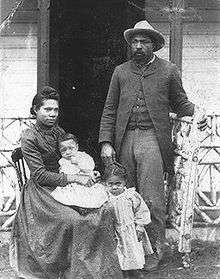John Ware (cowboy)
John Ware (c. 1845 – 11 September 1905) was an African-American cowboy best remembered for his ability to ride and train horses and for bringing the first cattle to Southern Alberta in 1882, helping to create that province's important ranching industry.[1]

Ware was born into slavery on a plantation near Georgetown, South Carolina. After the American Civil War he left the Carolinas for Texas where he learned the skills of a rancher and became a cowboy. Ware's great stature and dedication to hard work made him a natural and allowed him to work his way up to Canada driving cattle from Texas to Montana and then into the great plains that would eventually become Alberta. Upon his arrival in Calgary he found work at the Bar U and Quorn ranches[2] before starting his own ranch near the Red Deer river.[3] By 1900, he and his wife, Mildred Lewis (1871–1905[4]), had five children. He moved from the Calgary area to a spot northeast of the village of Duchess, Alberta. In 1902 his first home was destroyed by the spring flood. He rebuilt on higher ground overlooking a stream, now called Ware Creek. Three years later Mildred died of pneumonia in the spring; despite being a master horseman John was killed in the fall when his horse tripped in a badger hole crushing its rider and breaking his neck. Ware's funeral was reported to be one of the largest held in the early days of Calgary.
Like any folk hero there are a wide range of tales about his ability to eat, ride, shoot, and contribute to Western culture. It is said that he was never tossed from a wild horse and that he popularized steer wrestling, which would then become a highlight of the Calgary Stampede. The story of John Ware is that of a remarkable figure in history who helped to lay the foundations of the ranching industry in western Canada and at the same time defying stereotypes. Born into slavery, Ware worked his way to being one of the most well-respected figures in frontier Alberta, crossing race lines thanks to his good nature and hard work.
Legacy
Ware is the subject of a biography, John Ware's Cow Country by J. W. Grant MacEwan (Edmonton: Institute of Applied Art, 1960. Second edition, Saskatoon: Western Producer Prairie Books, 1973. Third edition, Vancouver: Greystone Books, 1995.)
Ware is also the subject of a fictionalized account of his exploits in a book called, "High Rider" by Bill Gallaher. Touchwood Editions. ISBN 978-1-77151-114-8.
Several geographical features near the Wares' ranch are named in their honour:
Other namesakes include "John Ware Junior High School" in southwest Calgary, the John Ware building at Calgary's Southern Alberta Institute of Technology (SAIT), a polytechnic undergraduate college, and the John Ware 4-H Beef Club in Duchess, Alberta. In 1958 the modest log cabin that was the family home from 1900 to 1905 was relocated from its prairie setting near Millicent, Alberta, to the Red Deer River valley in Dinosaur Provincial Park, about 20 kilometres to the east. The cabin was restored and rededicated in 2002. Diamond Joe White, a musician from Alberta, has released a song titled "High Rider: The John Ware Story".
None of John and Mildred's five children who lived to adulthood had descendants. Their last surviving daughter, Nettie, died on her 96th birthday in March 1989 in Vulcan, Alberta. Their last son, Arthur, died in Burnaby, British Columbia, in May 1989; however, relatives of Mildred Ware still reside in New Jersey and British Columbia.
In 2006, a small fragment of wood from the cabin at Dinosaur Provincial Park was contributed to the Six String Nation project. The fragment now serves as the top-most element on the pick-guard assembly of Voyageur, the guitar at the heart of the project.[9]
Canada Post issued a commemorative stamp featuring John Ware, to celebrate Black History Month 2012.[10]
References
- Government of Alberta - About - History
- "Archived copy". Archived from the original on 2007-09-28. Retrieved 2007-08-01.CS1 maint: archived copy as title (link)
- Laura Neilson Bonikowsky, "John Ware" Archived 2007-09-30 at the Wayback Machine, The Canadian Encyclopedia, 27 January 2013.
- Sanderson, Kay (1999). 200 Remarkable Alberta Women. Calgary: Famous Five Foundation. p. 22.
- "John Ware Ridge". Canadian Geographical Names. Natural Resources Canada.
- "Nigger John Ridge". Canadian Geographical Names. Natural Resources Canada.
- "Mount Ware". Canadian Geographical Names. Natural Resources Canada.
- "Ware Creek". Canadian Geographical Names. Natural Resources Canada.
- Jowi., Taylor (2009). Six string nation : 64 pieces, 6 strings, 1 Canada, 1 guitar. Vancouver: Douglas & McIntyre. ISBN 9781553653936. OCLC 302060380.
- https://calgaryherald.com/life/Stamp+honours+iconic+Alberta+cowboy+John+Ware/6087276/story.html#ixzz1qXmu8X42
External links
- "Ware, John" at The Canadian Encyclopedia
- "John Ware". Dictionary of Canadian Biography (online ed.). University of Toronto Press. 1979–2016.
- "Who Was John Ware?" from Alberta Parks
- "John Ware - Canada's Legendary Cowboy" at the Wayback Machine (archived April 3, 2008) Personal account and history of John Ware and his family, including his daughter Mildred Ware.